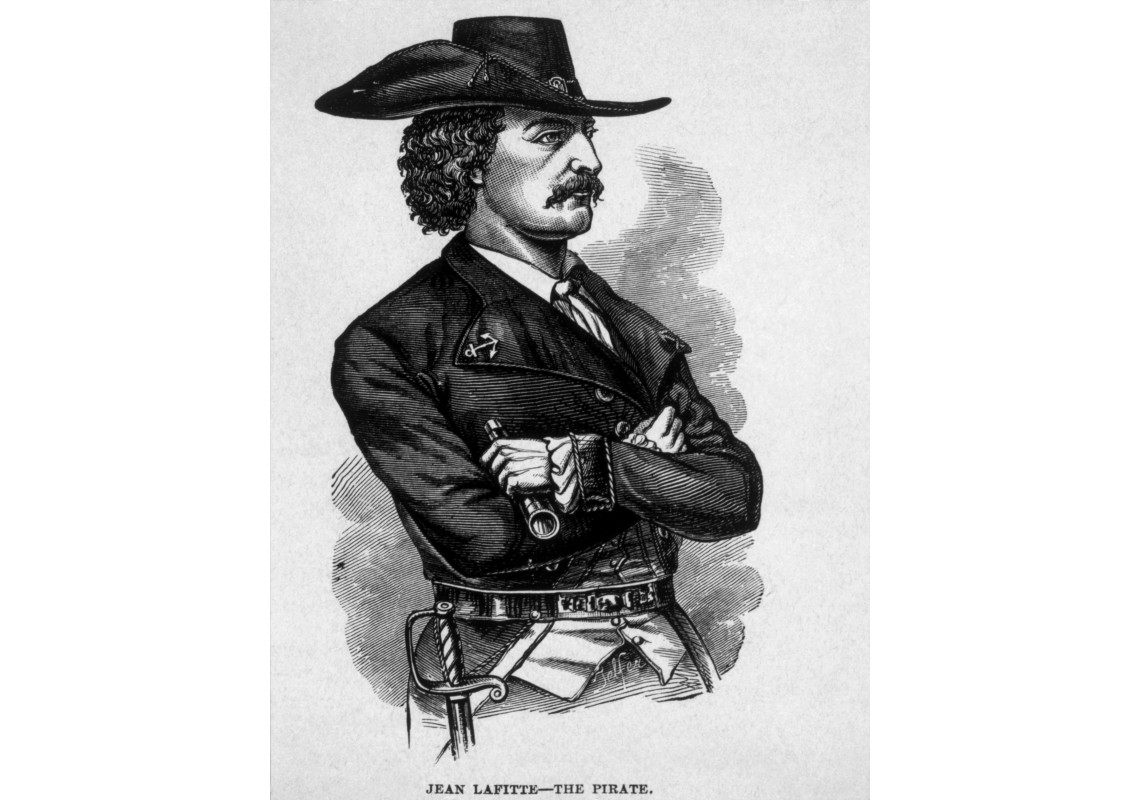Who was Jean Lafitte?
- October 10, 2020
- 4031
- 0
- 0
Jean Lafitte: an American pirate or national hero? When and where he was born is unclear, and when and where he died is a mystery. And yet, he remains one of the most recognized names and talked about figures in New Orleans and Louisiana history. Although the facts vary, the stories are the same: he made a name for himself as a privateer and became a hero to many Louisiana natives.
Beginnings of a Pirate Life
Born sometime between 1770 and 1776 either in France or maybe in what’s now Tahiti (we told you the facts varied!), Lafitte’s first appearance is around 1804 when Louisiana first became part of the United States. In 1807, an Embargo Act came into effect proclaiming that no American ships could visit foreign ports. Smugglers routes opened up, illegal goods came into Louisiana ports and Lafitte took full advantage of the situation. Working with his brother out of Barataria Bay, an illegal island port just far enough away from a US naval base, Lafitte’s privateering and smuggling was rampant and unnoticed. New Orleans benefitted from the free, untaxed trading and the people hailed him as a hero, but to the US government, Lafitte was a criminal.
Lafitte’s Criminal Empire
Outfitting privateers and organizing the shipments and sale of smuggled goods, the business flourished, but Lafitte wanted more. The brothers moved from brokers to owning their own fleet of pirate ships. Their first big capture was in January of 1813. The profit gained from the sale of the ship’s cargo amounted to more than $18,000 - more than $525,000 in today’s currency! They were on to a good thing. The story goes that the brothers often released ships back to their captain and crew, gaining them a reputation for fair treatment. They also learned how to ‘fool’ the naval officials by listing goods that were already in Barataria storehouses. The officials weren’t very careful about checking cargo manifests.
What Did Lafitte Do for Louisiana?
Besides bringing luxury items and things not permitted to the people of New Orleans because of the embargo, Lafitte was instrumental in protecting the ports during the War of 1812. The Battle of New Orleans made General Andrew Jackson an American hero, but it was Lafitte who, after turning down an offer from the British to capture New Orleans, aligned with General Jackson when his fleet of pirates was captured. Offering his services and using canons that he had built along the shores, Lafitte helped defeat the British in exchange for pardons for his pirate crews. During the great battle on January 8, 1815, gunpowder and flints from Barataria's stolen booty supplied the army with enough firepower to win the day.
Once a Pirate, Always a Pirate
After becoming free men once more, the Lafitte brothers got tired of living life on the straight and narrow, so they decided to move to Galveston Island where they continued their pirating antics. In their new pirate colony named Campeche they were hired by the Spanish to be spies during the Mexican War of Independence and continued their thieving and smuggling until death. Just as the start to his story is full of obscurities, so is the end of the story of the New Orleans Pirate. Some say he was swept away by a hurricane on one of his ships or maybe it was death from a wound in battle off the coast of Honduras in 1823. Others note he died of a fever in Mexico around 1826, but one thing is clear, the legacy of Jean Lafitte lives on today.
A Rare Journal Appears
In the 1940s, a man - who claimed to be the great-grandson of Jean Lafitte - presented a journal that contained 257 pages of handwritten text that he had been given from family collections. These texts changed the date of Lafitte’s death and challenged many other facts about his life and adventures. Even after years of research and study, the texts remain controversial and unauthenticated. At the end of the day, Jean Lafitte is a figure of a romantic and brutal time that just happens to be a part of our wonderful folklore in South Louisiana. Whether you’re visiting a national park named after him, having a drink in a bar with his name or reading books and watching films about him, it’s clear that Jean Lafitte was a prominent and important figure that still awakens curiosity in those exploring all the riches of Southern Louisiana.

